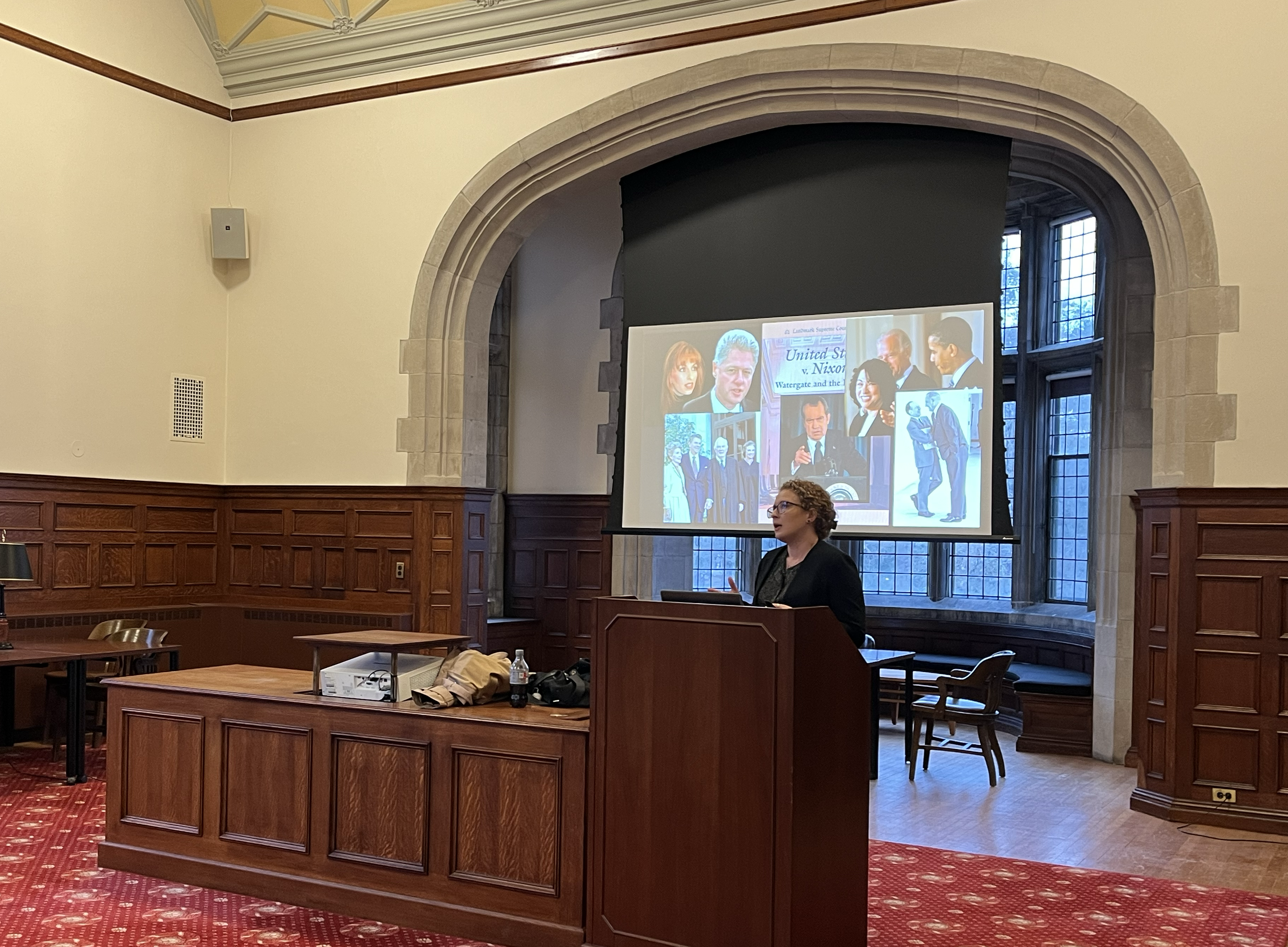Lauren Mattioli discusses presidential influence on the judiciary
April 18, 2025
 Carolina Weatherall
Carolina WeatherallOn Tuesday afternoon, Boston University professor Lauren Mattioli spoke in the Shannon Room in Hubbard Hall on how presidents can carry out a judicial agenda through appointments. Her talk, titled “Appointments and Influence: Judicial Agenda Setting Across Three Presidential Administrations,” was organized by the Department of Government and Legal Studies and sponsored by the John C. Donovan Lecture Fund.
Mattioli’s research is part of a book she is writing, and she explained that her work began with the broad question, “Why do presidents care about the courts?” This led her to create a framework for comparing presidents’ judicial agendas.
“I approach this question with the creation of what I call a judicial agenda,” Mattioli said. “That is, a set of policy priorities specific to the judiciary, and it is policies that are mostly enacted in courts.”
Mattioli emphasized that district courts, while often overlooked, are a place where the president can especially influence policy through the appointment of U.S. attorneys.
“The least well-known variety of advocacy, despite the fact that it is where the bulk of interaction between Article III judges and executives occurs, is at the trial level,” she said. “It’s at district courts, and it happens between U.S. attorneys and federal district court judges.”
Mattioli noted that U.S. attorneys are prosecutors who are theoretically concerned with doing the right thing on behalf of the government—convicting guilty people and acquitting innocent people. At the same time, she says they are also concerned with their own careers and may want to appease the president or party that appointed them.
“The [theory] that I find to be the most compelling is the idea that these folks are chosen very carefully,” Mattioli said. “The president chooses people that agree with him, that share his preferences for policy.”
Much of Mattioli’s research involves studying presidents’ rhetoric to determine their judicial agendas. She explained how she examined various examples of presidential rhetoric, from speeches to written statements, to determine each president’s key issues. Through this, she identified two case studies: President Barack Obama’s “Smart on Crime” agenda, which focused on drugs and drug trafficking, and President Donald Trump’s “American Carnage” agenda from his first term which centered around civil disorder.
Mattioli’s methodology stood out to audience member Sky Staes ’26.
“I think definitely the methodology that she employed was very rigorous. Going through all the names, especially because the database of all the U.S. attorneys doesn’t exist, that was pretty impressive to me,” Staes said.
According to Mattioli, Obama’s judicial appointment strategy was characterized by careful vetting of potential nominees. During this time, the Obama administration made the decision not to prosecute marijuana crimes that were decriminalized in individual states.
“They were all about delegating federal resources to policies that made sense, that comported with a broader sense of criminal justice progressivism and allocated resources to major offenders rather than just trying to get as many convictions as possible,” Mattioli said.
Presenting graphs to the audience, Mattioli pointed to a sharp decline in the number of marijuana cases prosecuted during Obama’s presidency, suggesting he was successful in enacting this agenda. There was one exception—prosecutions for simple possession remained fairly constant—which she said she is still examining. She also highlighted that the largest decrease in marijuana prosecutions was among temporary appointees who lacked job security, supporting the theory of career concerns playing a role in prosecutorial decisions.
In contrast, Mattioli argued that Trump’s term was characterized by a frequent churn in judicial appointees and limited evidence of vetting. She explained that Trump expanded the idea of civil disorder beyond its strict legal definition but this did not result in a noticeable increase in prosecutions in this realm.
“It’s possible that President Trump’s appointment strategy just didn’t give appointees an opportunity to make a difference in this area,” Mattioli said. “The measure of the crime is still new, the civil disorder, but the trend is pretty clear that Trump appointees were not really distinguishable from Obama appointees on these types of prosecutions.”
As she wraps up her project, Mattioli said she is still sorting through data on her third case study: Biden-era corporate and white-collar crime. While not all her results were what she expected, she emphasized the importance in studying the relationship between the executive and judiciary.
“What I want you to remember from this talk is that presidents have judicial policy agendas and they try to pursue them,” she said.
Attendee Amelia Kane ’27 appreciated Mattioli’s comparison of trends across presidential administrations.
“It was interesting to see how judicial priorities … are impacted through the role of U.S. attorneys and to see across the different presidential administrations how that’s been executed,” she said.
Andy Robinson contributed to this report.

Comments
Before submitting a comment, please review our comment policy. Some key points from the policy: